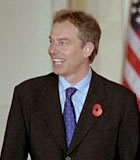
I was asked yesterday about whether Tony Blair might be a suitable candidate to become the first ever elected president of the European Council. The post is created in the Reform Treaty and so will be ready to be filled in 2009.
I must confess I was a bit surprised by this suggestion, given what has happened to his reputation over the war in Iraq, but maybe that is just a British perception. What matters more is how he is seen in other countries, not how he is seen here. (I don’t want to fall into the eurosceptic trap of imagining that the rest of the world ought to look at things just the way we do.)
And, looking at the post itself, it seems to be something that Tony Blair would be suited for. The powers of the post, as spelled out in article 9B of the future treaty, are rather few:
“6. The President of the European Council:
(a) shall chair it and drive forward its work;
(b) shall ensure the preparation and continuity of the work of the European Council in cooperation with the President of the Commission, and on the basis of the work of the General Affairs Council;
(c) shall endeavour to facilitate cohesion and consensus within the European Council;
(d) shall present a report to the European Parliament after each of the meetings of the European Council.
The President of the European Council shall, at his level and in that capacity, ensure the external representation of the Union on issues concerning its common foreign and security policy, without prejudice to the powers of the High Representative of the Union for Foreign Affairs and Security Policy.”
They are based on communication and encouragement, rather than anything more concrete. Control over legislation and the budget remains with the Commission, subject to the scrutiny and approval of the Council and the Parliament. Whatever else this blog has said about Tony Blair, communication and encouragement is something he is good at.
But there is a further consideration, which is the appointment process. The post will be filled by Qualified Majority Vote within the European Council itself, but there is more to it than that. While there is no formal power of veto permitted in the treaty on this point, in practice it would be almost impossible to do the job if there was substantial opposition at the outset. By taking into account the size and number of opposing member states, the seriousness of their objections and the extent of their willingness to make a fuss, political scientists could probably come up with some kind of formula to predict what how small a blocking minority might actually be, but we can be content for now with the conclusion that the president of the European Council can’t really be a controversial figure.
This conclusion is even more true in the case of the first president of the European Council. The new system will be finding its way in 2009, and that is not the time to take risks.
I remember that during the referendum campaign in Norway in 1994, one of the arguments used by the No campaign was about Norwegian importance in the world. It was so important, they said, that even the first secretary-general of the United Nations was Norwegian. The truth is the opposite, of course. The first secretary-general of the United Nations could be Norwegian precisely because Norway was not important. Having an American or a Russian in the role would have been controversial: having a Norwegian was quite safe. (And look at the nationalities of his successors: Swedish, Burmese, Austrian, Peruvian, Egyptian, Ghanaian and South Korean.)
In that light, the first president of the European Council is likely to come from a small member state, not a large one, so as not to appear so threatening to all the others. And if this is the case, that probably rules out Tony Blair.
